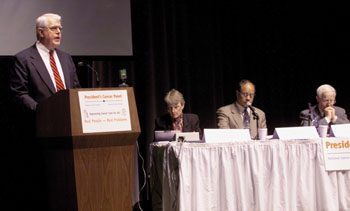
Dr. Clifton Meador, executive director of the Meharry-Vanderbilt Alliance, described the innovative initiative to the President's Cancer Panel. The panel included, from left, Maureen Wilson, Ph.D., Dr. Harold P. Freeman, and Dr. Paul Calabresi. (photo by Dana Johnson)
Obstacles highlighted at President’s Cancer Panel
The President’s Cancer Panel came to Vanderbilt University recently to hear from real people about the real problems standing between some Americans and the best available cancer care.
What the panel heard at its Southeastern Regional Hearings echoed challenges cited at prior hearings in Nebraska, Montana and Vermont – poverty, inadequate insurance coverage, language, cultural and educational barriers, lack of transportation, and distrust in the medical establishment, among others.
The emergence of so many recurring themes suggests that many of these challenges are important and all too commonplace, said panel chairman Dr. Harold Freeman.
“Statistics only go so far to tell the story,” Freeman said. “In the end, we can only understand this by hearing from real people facing these very real problems.”
Congress established the President’s Cancer Panel in 1971 to advise the President on the progress and problems of the National Cancer Program. In its 1999 report, the three-member panel noted a significant “disconnect” between scientific advances and their application. “We are failing to apply all we know about prevention and treatment to all segments of the American population,” Freeman said.
Thus, the panel began a series of regional hearings to identify challenges on the community level and to learn what’s working and what’s needed to address inequities. The panel will report to the President next year.
The Vanderbilt-Ingram Cancer Center served as host for the Southeastern Hearings, which were held in Langford Auditorium Nov. 16-17. Testimony was heard from representatives of Tennessee, Florida, Alabama, South Carolina, North Carolina, Georgia, Mississippi, Kentucky, Puerto Rico and the U.S. Virgin Islands.
Participants told of people living in isolated rural areas with no nearby mammography facilities, cancer specialists or hospitals. They told of immigrants who are functionally illiterate in their own language and whose lack of legal status in this country prevents them from accessing publicly funded care. They shared experiences of being fired from jobs after long treatment regimens or of being unable to get new jobs because they have had cancer. And they lamented the availability of screening to detect cancer without accompanying assurances for treatment when disease is found.
While lack of insurance coverage was a commonly heard challenge, even having coverage is not always enough to ensure proper treatment, the panel heard. One participant, Sherry Davis of Bradenton, Fla., described “driving across three counties” to find an oncologist who would accept her insurance. The breast cancer survivor was covered under Medicaid, but many oncologists would not accept her as a patient because of the company’s reputation for slow, if any, payments to physicians.
The panel also heard about a 32-year-old woman in Johnson City, Tenn., who died before receiving a bone marrow transplant because community bake sales and other fund-raisers weren’t enough to cover costs.
“If you ask me, bake sales are a lousy way to ensure adequate cancer treatment,” said attorney Gordon Bonnyman, one of Tennessee’s representatives.
The panel also heard about challenges in providing cancer care for the southeastern region’s immigrant population, which is growing in both size and diversity. This brings new challenges, including cultural and religious beliefs about cancer that inhibit patients from seeking care. For instance, some patients may believe that cancer is a punishment from God about which nothing can be done or that it is the result of a curse.
Freeman was joined in the hearings by outgoing panel member Dr. Paul Calebresi; Maureen Wilson, Ph.D., executive secretary of the panel and assistant NCI director; and Dr. Robert Hiatt, deputy director of the NCI’s Division of Cancer Control and Population Science. Other panel members are Dr. Dennis Slamon of UCLA and Fran Visco, president of the National Breast Cancer Coalition.
The hearings were welcomed by Dr. Harry Jacobson, vice chancellor for Health Affairs; Dr. Harold Moses, director of the Vanderbilt-Ingram Cancer Center; and Dr. John Maupin, president of Meharry Medical College.
“This panel is addressing what I consider one of our greatest challenges, the variability with which health care is delivered today,” Jacobson said.
Moses, Maupin and Dr. Clifton Meador, executive director of the Meharry-Vanderbilt Alliance, outlined for the panel the innovative collaboration between the two medical schools to address racial, social and economic disparities in health status.
“I know from my days in the military and in ROTC that a war is not won until the battles are won on every front,” Maupin told the panel. “I believe that great ideas will come from our collective efforts.”














